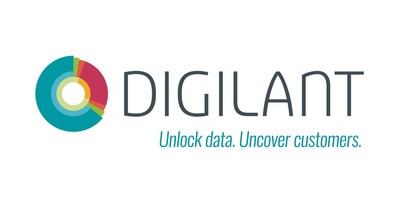TMCnet News
Digilant Hosts Panel On Blockchain Innovation in Ad TechBOSTON, June 28, 2018 /PRNewswire/ -- Digilant, a global provider of programmatic ad buying solutions and services, assembled a panel of speakers in Boston, to discuss the impact of blockchain innovation on the advertising technology industry. The panel was moderated by Adam Cahill, Executive Chairman, Digilant US and CEO of Anagram and the panelists included:
One of the more prominent buzzwords in digital circles these days is "blockchain" and, as is the case in the early days of a market trend, there's significant confusion about its meaning, application, and future. That's certainly the case with blockchain in general, and more specifically, what it means to marketers and digital media professionals. To give our community insight into where this trend is going, Digilant pulled together ad tech's leading experts on the topic of blockchain for a dinner panel at the scenic Legal Harborside in Boston's Seaport District. The room was full of leaders across the spectrum of digital media buyers, technologists, and investors. After an hour of conversation, everyone walked away with a deeper understanding of the topic but here are the highlights. The Digital Media Supply Chain Is A Serious Problem Looking For a Solution That the advertising industry has efficiency challenges to address is undeniable. And while digital advertising channels have created more opportunities to address consumers where they are across screens and experiences, the supply chain needed to deliver relevant and compelling ads is complex – likely, unnecessarily so – to the detriment of the channel. By some estimates, more than 50% of internet advertising is wasted due to issues relating to viewability, fraud, and transparency. In an industry category that totaled almost $90 billion in the U.S. last year, according to the IAB and PwC, that means serious dollars are frittering away. Joe Zawadzki of MediaMath, one of the largest independent digital advertising software companies, described the reach and complexity of the supply chain challenges: "In too many instances, advertisers lack transparency, discrepancies arise among stakeholders, inventory fails to meet quality standards, and/or a noisy minority of bad actors exploits internet infrastructure weaknesses to siphon unearned value from the ecosystem." And this doesn't even speak to the privacy and GDPR concerns that have been front-and-center in recent months, which add yet additional complexity. While industry associations and watchgroups have been discussing these challenges for years, momentum accelerated in 2017 when CMOs from some of the largest advertisers on the planet -- Procter & Gamble, Unilever, Bank of America -- began talking about the issues publicly and frequently. In turn, the mainstream business press now covers the trends more closely, and that means CEs and CFOs have been put on alert. That of course means that CMOs need to be armed with information and problem-solving tactics to explain how they are addressing the problem. And blockchain will be part of the longer term solution. MediaMath has already started working towards integrating blockchain for their programmatic platform by announcing its investment in a new business, Underscore CLT. How Blockchain Works? At its core, blockchain is a relatively complex and technical suite of technologies that "allows a network of computers to agree at regular intervals on the true state of a distributed ledger," according to Christian Catalini of MIT. And a quick Google search reveals a slew of explanations, including this user-friendly video from Simply Explained. Isaac Lidsky of Underscore CLT, offered an analog example to explain blockchain. "Imagine," he explained, "that it's the Middle Ages and you're a general of an army that's loosely confederated with other armies, and you're about to attack a position that's defended by the Roman Army. If the attacking armies act in concert and coordinate their attack, everything will work out great. The worst thing they can do is not act in coordination. But at the same time, it's impossible to trust the communications being transferred by the generals and their runners. It's similar to the situation faced by advertisers, publishers, and intermediaries today -- except more complex; there are thousands of players involved, and blockchain technology offers the ability to facilitate communication and transaction which can be taken as the truth." Sound complicated? It is. But marketers don't need to worry too much about the underpinnings of blockchain. Others will figure that out -- entrepreneurs, technology companies, regulators and the like. But just like marketers don't need to understand how the internet works, they do need to understand its implications on the ability to go to market effectively for their companies and clients. Blockchain Will Disrupt The Ad-Tech Supply Chain In The Near Future Blockchain will offer significant benefits to marketers -- and it will probably be disruptive at one point but we are not sure when -- the technology being used to power digital advertising today is due for a significant upgrade, and quick fixes are not a longer term solution. That's why MediaMath, Facebook, Google, Amazon and others are all investing in blockchain right now as the marketplace expects more data privacy and transactional transparency from these advertising giants. Erich Wasserman, CoFounder of MediaMath thinks that "there are structural imbalances, fraud in the marketplace, vendors of dubious value, and people are unclear what the contribution to the value actually is by individual participants. We are in need of a mechanism to go deeper into the ad impression and surface what exact value individual technologies are adding to the return on investment." Ross Benes of eMarketer summarizes the promise and challenges of blockchain neatly in a recent piece. "Some ad industry observers believe that blockchain's open and distributed ledger could clear up some of these issues by making advertising transactions more transparent. But right now, blockchain doesn't operate quickly enough to work in the fast-paced bidding world of programmatic advertising. Until the technology gets faster and more people adopt it..." Fortunately, if there is one thing of which we can be certain it is that technology will continue to develop and disrupt at rapid pace – which, of course, is the reason we're here discussing blockchain at all. As stated above, there is heavy investment in the technology, so marketers need to keep their eyes on the prize. It's going to be a race to the finish line. The first company able to mainstream the technology will write the rules for everyone else. When it comes to broad marketplace adoption, it's always difficult for new technologies to enter on a grand scale, and usually requires either massive investment from one or a handful of companies (think Android / Google), or a disruptive evolution in user behavior, such as the massive increase in smartphone adoption (negligible in mid 2000s to around 80% in mid 2010s). Companies like MediaMath and Underscore CLT are working on the speed and adoption issues, while organization's such as Dave Balter's Flipside Crypto are constantly on the lookout for attractive companies to invest in that rely on blockchain technology or infrastructure. Dave Balter used an analogy to the music industry to explain the resistance of some in the ad industry to adopting blockchain: "at first, the music industry was very opposed to digital music. It was a ten year process to get them to adapt to the digital side but they quickly realized it was a process in which they would make a little less money in the short term, while transitioning to secure a sustainable future." In Summary The dinner panel was a great education for all who attended, an opportunity to hear from real experts, and get a glimpse into how blockchain could impact the digital advertising business. And like MediaMath, we are very concerned about the internet advertising supply chain, as it's core to our business -- and these are the areas of our industry where blockchain could be most impactful, at least over the next several years. So these are the three primary takeaways:
About Digilant Digilant offers programmatic buying solutions and services designed for independent agencies and brands that are increasing their programmatic spending. Using data science to unlock 'new' automated buying strategies, Digilant enables brands to uncover proprietary and complex audience data that gives them the actionable intelligence they need to compete across every important media channel. Digilant is an ispDigital Group Company. For more information, visit us at www.digilant.com, read our blog or follow us on Twitter @Digilant_US. Related Links https://www.digilant.com
SOURCE Digilant 
|


